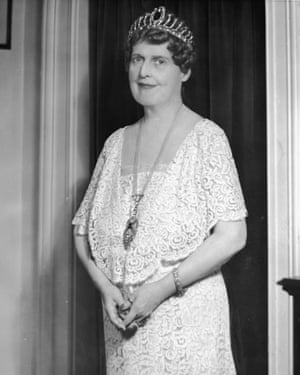
Doing something that you love, but doing it badly, can sometimes pay off. The New York socialite and amateur opera singer Florence Foster Jenkinswas a popular joke in her own time, but more than 70 years after her death she has earned her place in the cultural pantheon as the inspiration for at least two successful stage shows, and this spring, two rival films.
In May, Meryl Streep will be seen in the pearls and jewelled headband of the deluded star in a British-made film, Florence Foster Jenkins, that co-stars Hugh Grant as her dashing manager and partner, the middle-ranking English Shakespearean actor St Clair Bayfield. A French version of the Jenkins story, the acclaimed Marguerite, came out last month and stars Catherine Frot as the so-called “diva of din”.
Directed by Stephen Frears, who made the award-winning Philomena and The Queen, the movie – made by BBC Films – will tell the story of the last few years of this unconventional singing career. The daughter of a wealthy Philadelphia lawyer, Jenkins was convinced that her love of music could, with training, transform her into a talented soprano – one who would follow in the footsteps of contemporaries such as Frieda Hempel, Lily Pons and Luisa Tetrazzini. But Jenkins’s audiences were unconvinced, and a surviving 78rpm recording of her gamely attempting the Queen of the Night’s coloratura gymnastics from Mozart’sThe Magic Flute has amazed generations of listeners.
“There is a famous recording of her, and I was told that back in the 60s people used to play it at dinner parties,” said Frears. “I heard her singing [in an audio clip] on YouTube and it was gobsmacking. The recording is so hilarious and dreadful but also touching and so affecting.”
Over time, and by inviting guests to recitals, the real Jenkins built up an affectionate, satirical public following. Her tone-deaf musical peak was reached in 1944 at a sellout concert in Carnegie Hall, New York. Amused punters queued around the block to see the singing society dame in the flesh. It is the nerve-racking runup to this ill-advised concert, given a month before Jenkins died, that forms the centre of Nichola Martin’s screenplay for the film. “The central characters of Florence and Bayfield are ridiculous, touching and preposterous at the same time but they work well together,” said Frears.
“Bayfield was an unsuccessful actor when they met and clicked – he found a way to live and she found a man who loved her and looked after her, even though he may be a philanderer. What more could she want?”
But for Streep the pathos of this ostensibly comic character stems from the generous part that Jenkins once played in Manhattan’s cultural scene.
“The real Florence Foster Jenkins was the ultimate club lady,” Streep said. “Those were the days when the professions were not open to women, so there were women of means who to keep themselves busy did charitable good works. Florence was a great patron of the arts in New York and that’s how she moved up through the social echelons of society. She kept the musical life of the city alive – she underwrote concerts at Carnegie Hall and spread around the money she had inherited from her husband and father.”
Jenkins entertained sympathetic fans of opera at events mounted by the Verdi Club she had founded and funded. She also wore a bewildering succession of costumes which she had designed for performing specific arias.

“Florence was a person who kept something we all have when we are children – when you can’t really do anything that well, but you hurl yourself into the imagining of it and take delight in the doing,” said Streep. “It’s the purist meaning of the word amateur. She only sang for her friends and hand-picked audiences – the exception being the Carnegie Hall performance – because she couldn’t sing that well, but she loved it and loved music, and there’s something of that delight in our script.”
Aided by Jenkins’s pianist Cosme McMoon, played by Simon Helberg of The Big Bang Theory, Bayfield aimed to protect Jenkins from the realisation that she could not hold a note.
“I was vaguely aware of Florence Foster Jenkins,” said Grant, who will be making his highest-profile screen outing for some years opposite Streep.
“I remember years ago my cousin sent me this tape of the worst singer in the world, and thinking it was up there with the funniest things I’d ever heard. But I wasn’t doing much acting because I was involved in the Hacked Off press transparency campaign. One of our supporters is Stephen Frears and he used to come to some of our events and would say ‘We should do a film together’, and I’d tell him I wasn‘t really acting any more.
“But he sent me Nicholas Martin’s script, which was truly brilliant, genuinely funny and real and touching. Meryl Streep was already cast as Florence, so I had to do it.”
During the making of the film Frears noted that Jenkins had often reminded him of Margaret Dumont, the comic actress who appears in many Marx Brothers films as the butt of their jokes. The creators of the French film appear to have made the same connection. Their Gallic version of Jenkins is called Marguerite Dumont. It is a role that has already earned Frot France’s most prestigious acting award, a César.
Frot’s director, Xavier Giannoli, has expressed surprise that the films have been released within a few weeks of each other. “I am very curious,” he said last week. “I’m glad it’s coming after my film. I hope the two films do not damage each other. I don’t think they will.”
Jenkins also inspired two stage shows in 2005. In London Peter Quilter’s comic play Glorious! received Olivier nominations and has continued to be performed. It starred Maureen Lipman as Jenkins. “Her story is one of triumph over embarrassment,” the actress said at the time. “If you have the will and the stamina and the self-belief, you will triumph, even if, like Florence, you’ve been dead for 60 years when you finally get your true recognition.”
On Broadway, Stephen Temperley also had success that year with a revue based on Jenkins’s life. It was called Souvenir because the singer felt she should make her notorious recording of the Queen of the Night so that loyal fans could keep “a lovely souvenir” once her voice had.
The American singer gained fame in the 1960s for her off-key renditions of Moon River and Downtown. Her powerful style was sub-Ethel Merman and also famously compared to the sound of “roaches scurrying across a trash can lid”. All the same, Downtown reached the Billboard Hot 100 singles chart in April 1966.
EDWARD BULWER-LYTTON
1803-1873
Creator of sayings such as “the pen is mightier than the sword”, the writer’s name is sadly now associated with the overwrought opening of his 1830 novel Paul Clifford: “It was a dark and stormy night; the rain fell in torrents – except at occasional intervals, when it was checked by a violent gust of wind which swept up the streets …”
The Scottish weaver and actor is best remembered for his doggerel poems, Including The Tay Bridge Disaster. They are regarded as some of the worst in English literature because they scan badly and employ unsuitable metaphors. He was engaged to give recitations as if he were a standup comedian.
[Source:- The Guardian]




